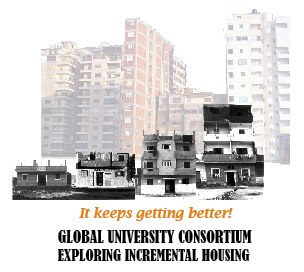
 INCREMENTAL HOUSING – AN URBAN PROACTIVE STRATEGY TO MEET THE GROWTH CHALLENGES OF THE NEXT 20 YEARS
INCREMENTAL HOUSING – AN URBAN PROACTIVE STRATEGY TO MEET THE GROWTH CHALLENGES OF THE NEXT 20 YEARS
Tuesday, 23 March 2010, 16:30–18:30, Room W2‐7
SUMMARY OVERVIEW of NETWORK SESSION - Nicole Beattie, Campbell Mayer, Aylin Brigitte Yildirim
INTRODUCTION – Dr. Reinhard Goethert
- What changed? Why going back for the future?
- Population and city expansion frightening
- Inability to cope
- Cannot continue to upgrade as main strategy
- Informal is working
- Why incremental housing strategy?
- Informal sector – a partner with demonstrated energy – it works!
- Why survey informal for the way forward?
- Process orientation, nonformal ideas
DEJU VU? SITE AND SERVICES/CORE HOUSING (10 minutes) - Prof. Pat Wakely Professor Emeritus of Urban Development in London
- University and formerly Director of the Development Planning Unit (DPU)
- What is it? Mimics informal development
- Where did incremental housing come from?
- Response to squatter explosion in Latin America; The experience of the 1970s and 80s; Why did site and services/core housing lose favor?
Longitudinal Surveys of Incremental Housing – An Overview (90 minutes)
Presenters will introduce experience as background for further individual discussion. The presentation and brief text with further description will be available as handout.
Latin America
■ Chile – Pontificia Universidad Católica de Chile
FROM THE 60s TO THE 90s – CORE TO CONTEMPORARY
Prof. Margarita Greene Z.
A short summary of the Chilean experience in incremental housing, starting from the sites and services of the 60's, through the 'vivienda progresiva' of the 90s, and the 'fondo solidario de vivienda'. Informal incremental solutions are briefly reviewed, in addition to some special cases of good design, including the Elemental designs.
■ Mexico, Cuernavaca - SEPI-FAUAEM
FROM SQUATTER TO CITIZEN – THE RUBEN JARAMILLO SETTLEMENT
Mtra. Maria Isabel Vargas Mata
The transformation from an spontaneous to a consolidated Low Income Settlement, with highlights of the social and political organization experience.
■ Mexico, Chihuahua - Technologico de Monterrey
SHACKS TO HOMES
Arq. E. Benjamin Guerra Sousa
Representative incremental housing findings are presented. Thirty houses, ten minimum expansion, ten successful and ten very success expansion, from ten settlements were analyzed.
■ Brazil - Federal University of Rio Grande do Sul
INCREMENTAL HOUSING IN BRAZIL: RESEARCH AND DESIGN METHODS
Andrea Mussi (PhD Student); Prof. Benamy Turkienicz
A brief account of the four decades of incremental history and introduce recent methodological developments, comprising architectural, urban and sociological aspects. Analytical models and Design Models will be assessed and discussed, exploring a shape grammar paradigm to anticipate transformations
East Africa
■ Kenya – University of Nairobi
MODEL PROGRAMS OF THE 70s AND 80s WITH WORLD BANK AND USAID SUPPORT
Prof. Tom Anyamba
Examples of incremental expansion are reviewed from early site and services projects, including the Dandora and Umoja.
North Africa
■ Sudan
INCREMENTAL HOUSING IN KHARTOUM – A PARADIGM SHIFT?
Dr. Gamal Hamid
After almost half a century of providing serviced plots as the prime housing delivery mechanism, the Sudanese government has shifted since the early 1990s to provision of incremental housing. To what extent has this shift been successful?
Asia
■ Thailand – Thammasat University
INCREMENTAL HOUSING IN BANGKOK
Dr. Wijitbusaba Ann Marome, Dr. Supreedee Duke Rittironk
(Presented by Aylin Brigitte Yildirim, SIGUS Support Team)
■ Turkey - Istanbul Teknik Universitesi
THE SOCIOSPATIAL TRANSPORMATION IN YENI SAHRA SQUATTER SETTLEMENT
1969-2009
Prof. Aytanga Dener
The sociospatial transformation in Yeni Sahra squatter settlement which is adjacent to new satellite settlements, hyper markets and malls in Istanbul will be documented with interviews with local people and community leader (muhtar). Plans of the sample houses, the schematic expression of the former alterations and photographic images of the buildings in relation to the environment will be shown.
Europe
■ Poland – Warsaw University of Technology
THE POLISH INCREMENTAL HOUSING EXPERIENCE
Prof. Lech Kłosiewicz
Polish experience with incremental housing, particularly during the critical housing shortage experience after WWII. Other examples of core house designs will be reviewed, together with a brief overview of housing policy shifts.
A Way Forward - Tools and Techniques (20 minutes)
A COMPUTER RULE-BASED MODEL FOR HOUSING DESIGN
Technical University of Lisbon; Prof. Jose Duarte
Traditional approaches to mass housing led to uniform housing and dull urban environments. Today rule-based computer-aided design and manufacturing processes can overcome such flaws and produce customized houses and diverse urban environments that are sustainable and affordable.AN INNOVATIVE CELL PHONE SURVEY INTERFACE
MIT-mSurvey; Ken Griffith, Andrew Hoy
This presentation will demonstrate a cell-phone paperless approach to rapid, real-time, inexpensive surveys, directly from respondents. Advantages and utility of a cell-phone survey technique will be highlighted for use in data collection for housing and other data-related surveys. (Note: The Training Session on Thursday will go into more detail in the cell phone approach.)
Respondents
Eduardo Rojas Principal Urban Development Specialist, Interamerican Development Bank
Andre Herzog Senior Urban Specialist, World Bank Institute
Daphne Frank Senior Regional Planning, GTZ
Claudio Acioly Chief, Housing Policy Section; United Nations Human Settlements Programme; UN-HABITAT

